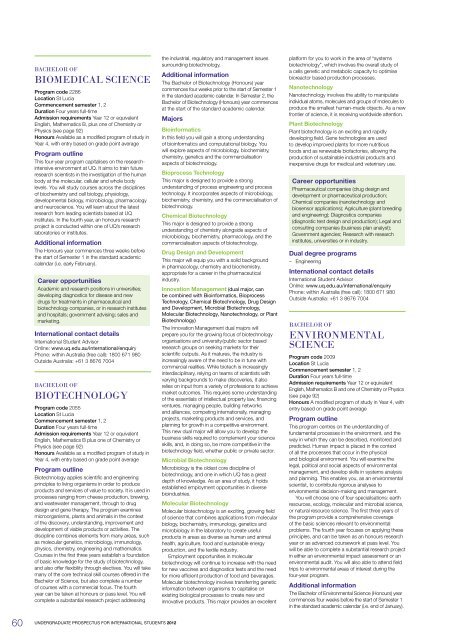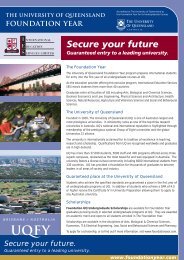UNDERgRADUATE PROSPECTUS - Study Brisbane
UNDERgRADUATE PROSPECTUS - Study Brisbane
UNDERgRADUATE PROSPECTUS - Study Brisbane
- No tags were found...
You also want an ePaper? Increase the reach of your titles
YUMPU automatically turns print PDFs into web optimized ePapers that Google loves.
Bachelor of<br />
Biomedical Science<br />
Program code 2286<br />
Location St Lucia<br />
Commencement semester 1, 2<br />
Duration Four years full-time<br />
Admission requirements Year 12 or equivalent<br />
English, Mathematics B, plus one of Chemistry or<br />
Physics (see page 92)<br />
Honours Available as a modified program of study in<br />
Year 4, with entry based on grade point average<br />
Program outline<br />
This four-year program capitalises on the researchintensive<br />
environment at UQ. It aims to train future<br />
research scientists in the investigation of the human<br />
body at the molecular, cellular and whole body<br />
levels. You will study courses across the disciplines<br />
of biochemistry and cell biology, physiology,<br />
developmental biology, microbiology, pharmacology<br />
and neuroscience. You will learn about the latest<br />
research from leading scientists based at UQ<br />
institutes. In the fourth year, an honours research<br />
project is conducted within one of UQ’s research<br />
laboratories or institutes.<br />
Additional information<br />
The Honours year commences three weeks before<br />
the start of Semester 1 in the standard academic<br />
calendar (i.e. early February).<br />
Career opportunities<br />
Academic and research positions in universities;<br />
developing diagnostics for disease and new<br />
drugs for treatments in pharmaceutical and<br />
biotechnology companies, or in research institutes<br />
and hospitals; government advising; sales and<br />
marketing.<br />
International contact details<br />
International Student Advisor<br />
Online: www.uq.edu.au/international/enquiry<br />
Phone: within Australia (free call): 1800 671 980<br />
Outside Australia: +61 3 8676 7004<br />
Bachelor of<br />
Biotechnology<br />
Program code 2055<br />
Location St Lucia<br />
Commencement semester 1, 2<br />
Duration Four years full-time<br />
Admission requirements Year 12 or equivalent<br />
English, Mathematics B plus one of Chemistry or<br />
Physics (see page 92)<br />
Honours Available as a modified program of study in<br />
Year 4, with entry based on grade point average<br />
Program outline<br />
Biotechnology applies scientific and engineering<br />
principles to living organisms in order to produce<br />
products and services of value to society. It is used in<br />
processes ranging from cheese production, brewing,<br />
and wastewater management, through to drug<br />
design and gene therapy. The program examines<br />
microorganisms, plants and animals in the context<br />
of the discovery, understanding, improvement and<br />
development of viable products or activities. The<br />
discipline combines elements from many areas, such<br />
as molecular genetics, microbiology, immunology,<br />
physics, chemistry, engineering and mathematics.<br />
Courses in the first three years establish a foundation<br />
of basic knowledge for the study of biotechnology,<br />
and also offer flexibility through electives. You will take<br />
many of the core technical skill courses offered in the<br />
Bachelor of Science, but also complete a number<br />
of courses with a commercial focus. The fourth<br />
year can be taken at honours or pass level. You will<br />
complete a substantial research project addressing<br />
the industrial, regulatory and management issues<br />
surrounding biotechnology.<br />
Additional information<br />
The Bachelor of Biotechnology (Honours) year<br />
commences four weeks prior to the start of Semester 1<br />
in the standard academic calendar. In Semester 2, the<br />
Bachelor of Biotechnology (Honours) year commences<br />
at the start of the standard academic calendar.<br />
Majors<br />
Bioinformatics<br />
In this field you will gain a strong understanding<br />
of bioinformatics and computational biology. You<br />
will explore aspects of microbiology, biochemistry,<br />
chemistry, genetics and the commercialisation<br />
aspects of biotechnology.<br />
Bioprocess Technology<br />
This major is designed to provide a strong<br />
understanding of process engineering and process<br />
technology. It incorporates aspects of microbiology,<br />
biochemistry, chemistry, and the commercialisation of<br />
biotechnology.<br />
Chemical Biotechnology<br />
This major is designed to provide a strong<br />
understanding of chemistry alongside aspects of<br />
microbiology, biochemistry, pharmacology, and the<br />
commercialisation aspects of biotechnology.<br />
Drug Design and Development<br />
This major will equip you with a solid background<br />
in pharmacology, chemistry and biochemistry,<br />
appropriate for a career in the pharmaceutical<br />
industry.<br />
Innovation Management (dual major, can<br />
be combined with Bioinformatics, Bioprocess<br />
Technology, Chemical Biotechnology, Drug Design<br />
and Development, Microbial Biotechnology,<br />
Molecular Biotechnology, Nanotechnology, or Plant<br />
Biotechnology)<br />
The Innovation Management dual majors will<br />
prepare you for the growing focus of biotechnology<br />
organisations and university/public sector based<br />
research groups on seeking markets for their<br />
scientific outputs. As it matures, the industry is<br />
increasingly aware of the need to be in tune with<br />
commercial realities. While biotech is increasingly<br />
interdisciplinary, relying on teams of scientists with<br />
varying backgrounds to make discoveries, it also<br />
relies on input from a variety of professions to achieve<br />
market outcomes. This requires some understanding<br />
of the essentials of intellectual property law, financing<br />
ventures, managing people, building networks<br />
and alliances, competing internationally, managing<br />
projects, marketing products and services, and<br />
planning for growth in a competitive environment.<br />
This new dual major will allow you to develop the<br />
business skills required to complement your science<br />
skills, and, in doing so, be more competitive in the<br />
biotechnology field, whether public or private sector.<br />
Microbial Biotechnology<br />
Microbiology is the oldest core discipline of<br />
biotechnology, and one in which UQ has a great<br />
depth of knowledge. As an area of study, it holds<br />
established employment opportunities in diverse<br />
bioindustries.<br />
Molecular Biotechnology<br />
Molecular biotechnology is an exciting, growing field<br />
of science that combines applications from molecular<br />
biology, biochemistry, immunology, genetics and<br />
microbiology in the laboratory to create useful<br />
products in areas as diverse as human and animal<br />
health, agriculture, food and sustainable energy<br />
production, and the textile industry.<br />
Employment opportunities in molecular<br />
biotechnology will continue to increase with the need<br />
for new vaccines and diagnostics tests and the need<br />
for more efficient production of food and beverages.<br />
Molecular biotechnology involves transferring genetic<br />
information between organisms to capitalise on<br />
existing biological processes to create new and<br />
innovative products. This major provides an excellent<br />
platform for you to work in the area of “systems<br />
biotechnology”, which involves the overall study of<br />
a cells genetic and metabolic capacity to optimise<br />
bioreactor based production processes.<br />
Nanotechnology<br />
Nanotechnology involves the ability to manipulate<br />
individual atoms, molecules and groups of molecules to<br />
produce the smallest human-made objects. As a new<br />
frontier of science, it is receiving worldwide attention.<br />
Plant Biotechnology<br />
Plant biotechnology is an exciting and rapidly<br />
developing field. Gene technologies are used<br />
to develop improved plants for more nutritious<br />
foods and as renewable biofactories, allowing the<br />
production of sustainable industrial products and<br />
inexpensive drugs for medical and veterinary use.<br />
Career opportunities<br />
Pharmaceutical companies (drug design and<br />
development or pharmaceutical production;<br />
Chemical companies (nanotechnology and<br />
biosensor applications); Agriculture (plant breeding<br />
and engineering); Diagnostics companies<br />
(diagnostic test design and production); Legal and<br />
consulting companies (business plan analyst);<br />
Government agencies; Research with research<br />
institutes, universities or in industry.<br />
Dual degree programs<br />
– Engineering<br />
International contact details<br />
International Student Advisor<br />
Online: www.uq.edu.au/international/enquiry<br />
Phone: within Australia (free call): 1800 671 980<br />
Outside Australia: +61 3 8676 7004<br />
Bachelor of<br />
Environmental<br />
Science<br />
Program code 2009<br />
Location St Lucia<br />
Commencement semester 1, 2<br />
Duration Four years full-time<br />
Admission requirements Year 12 or equivalent<br />
English, Mathematics B and one of Chemistry or Physics<br />
(see page 92)<br />
Honours A modified program of study in Year 4, with<br />
entry based on grade point average<br />
Program outline<br />
This program centres on the understanding of<br />
fundamental processes in the environment, and the<br />
way in which they can be described, monitored and<br />
predicted. Human impact is placed in the context<br />
of all the processes that occur in the physical<br />
and biological environment. You will examine the<br />
legal, political and social aspects of environmental<br />
management, and develop skills in systems analysis<br />
and planning. This enables you, as an environmental<br />
scientist, to contribute rigorous analyses to<br />
environmental decision-making and management.<br />
You will choose one of four specialisations: earth<br />
resources, ecology, molecular and microbial science,<br />
or natural resource science. The first three years of<br />
the program provide a comprehensive coverage<br />
of the basic sciences relevant to environmental<br />
problems. The fourth year focuses on applying these<br />
principles, and can be taken as an honours research<br />
year or as advanced coursework at pass level. You<br />
will be able to complete a substantial research project<br />
in either an environmental impact assessment or an<br />
environmental audit. You will also able to attend field<br />
trips to environmental areas of interest during the<br />
four-year program.<br />
Additional information<br />
The Bachelor of Environmental Science (Honours) year<br />
commences four weeks before the start of Semester 1<br />
in the standard academic calendar (i.e. end of January).<br />
60<br />
UNDERGRADUATE <strong>PROSPECTUS</strong> FOR INTERNATIONAL STUDENTS 2012

















